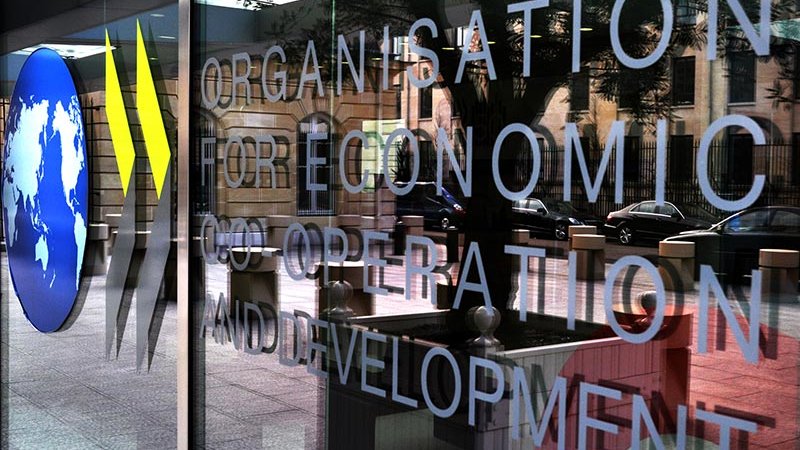
This Thursday, May 2, the Organization for Economic Cooperation and Development (OECD) published its report on “Economic outlook for 2024 and 2025”. For Argentina, the organization predicted a fall of 3.3% in GDP, being the country with the greatest contraction, far from Saudi Arabia, whose fall will be 0.2%.

The organization also foresees a slowdown in prices, although for this year it predicts an increase of 208.1%. By 2025, it calculates a drop in inflation that would reach 71.2% and growth of 2.7%. Although the latter would not be enough to recover from this year’s contraction (3.3%), which adds to the 1.6% drop in GDP in 2023.
In the report, the organization detailed that “high inflation”, the “considerable but necessary fiscal adjustment” of the Milei and “political uncertainty” will weigh on private consumption and investment during most of 2024, explaining the fall of 3 .3% for this year. This represents a worsening compared to the February projection when the OECD estimated a fall in product of 2.3% for this year. Likewise, the agency argued that “the gradual lifting of import restrictions and exchange controls will eventually drive the recovery of domestic demand, particularly in 2025.”
It is not surprising that the international organization that promotes policies of liberalization and fiscal austerity, pension and labor reforms such as those promoted by the Milei government, seeks to leave the horizon of a (tepid) recovery after the brutal collapse of activity and income to which their plans have consequences. But in any case it is forced to highlight the risks of a weak economy devastated by foreign exchange for the payment of present and future debt maturities.
A “sudden” drop in activity
In the report they indicate that “regulated prices increased rapidly in early 2024. Price controls have been eased since December to correct relative price distortions, resulting in the adjustment of electricity and transportation rates.” public, fuel prices, prepaid medications and rents.”
However, the OECD affirms that the “moderation” of the rise in prices is explained by a “sharp” drop in activity: “fiscal adjustment and the erosion of real income” mainly affected “industry, construction, retail sales, financial intermediation and public services.”

The organization also called for restoring “macroeconomic stability.” Although they affirm, in line with the agency’s policies, that “a more favorable business environment” will recover private investment and that “a stricter fiscal policy and the end of monetary financing will support further falls in inflation,” the agency warned about the “risks” of the scenario: “low foreign exchange reserves, tight monetary restrictions and high inflation create a volatile backdrop in which sudden currency depreciations and slow disinflation could trigger a prolonged recession.”
OECD world forecast: “stable global growth is expected for 2024 and 2025”
The global economy continues to grow at a modest pace, according to the latest OECD Economic Outlook. They project “constant global GDP growth of 3.1% in 2024, the same as 3.1% in 2023, followed by a slight rebound to 3.2% in 2025,” the report indicates.
They assure that the impact of “tight monetary conditions continues to be felt”, particularly in the real estate and credit markets, but global activity is proving relatively resilient, inflation continues to decline and private sector confidence is “improving”.
The OECD unemployment rate stood at 4.9% in February, near its lowest levels since 2001. Real incomes are rising in many OECD countries as inflation moderates and trade growth has become positive. The outlook continues to differ across countries: weaker results in many advanced economies, especially Europe, and strong growth in the United States and many emerging market economies.
Chinese growth continues to be even stronger and the agency raises its projection to 4.9% in 2024, compared to the 4.7% previously forecast, mainly due to an expansive fiscal policy, although they mark a slowdown for 2025 to 4.5%. %.
Adjustment and delivery
Milei and Caputo’s policies freeze the economy, consumption plummets due to the loss of purchasing power of wages. The adjustment at the request of the IMF generates a stoppage in economic activity that also impacts lower revenue and, therefore, failure to meet the deficit reduction goal proposed by the government. This can lead to a situation of permanent adjustment that never completely solves the problem of the fiscal deficit, even aggravating it, and requires new stages of cuts in public spending.
Added to this, the economic course that benefits concentrated capital and complies with the IMF generates a drain on foreign currency for the “odious debt” and a transfer in the “sharing of the cake” from the working masses to the big capitalists. It is a war plan against the working people that has left more than 3 million new poor since he took office, while the only thing that increases is the payment of the debt and the salaries of the senators
We must face Milei’s adjustment measures, with a true plan of struggle with strikes and mobilization of the union centers until the Bases Law is overturned. We cannot wait any longer.
Source: www.laizquierdadiario.com

